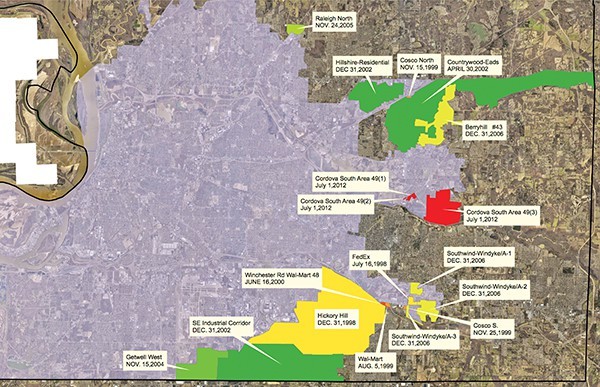
As this week’s Flyer cover story notes, the city of Memphis — in the judgment of numerous spokespersons for city interests — may have dodged another bullet in the General Assembly this week. This was a bill, the product of
longstanding collaboration between various opponents of urban expansion in Tennessee, that would have crippled the efforts of Memphis to right itself and resolve what was already a difficult financial predicament even before the advent of the bill.
The bill, still not formally dead, is a measure to facilitate de-annexation by residents of incorporated cities. It was proposed by two House members from the Chattanooga suburbs who two years ago had succeeded in establishing the principle of consent on the part of residents about to be annexed. The new bill has, in the lexicon of our time, gone a bridge too far beyond that. It would allow referenda on the part of residential areas annexed since 1998 to de-annex themselves, even if, in the words of Memphis Chamber of Commerce head Phil Trenary, the results would be “swiss cheese” urban maps, with gaping holes marking where formerly contiguous Memphis neighborhoods had existed side by side.
In the case of Memphis, there would be gaping holes in the city’s financial resources as well. Even those legislators who favored the bill — including suburban Shelby County legislators who helped to get it passed in the House of Representatives last week — acknowledged that it would occasion a $28 million annual loss in property tax and local-option sales tax revenues for the city.
And the bill’s proponents made no pretense of applying an objective standard to all urban areas in Tennessee. It singles out Memphis and four other areas — Knoxville, Chattanooga, Kingsport, and tiny Cornersville — as liable for redress penalties on account of allegedly “egregious” annexations of adjacent territories. That these annexations were all performed in perfect compliance with the letter of Tennessee law was of no matter to the authors of the bill. Nor was the fact that the bill would up-end the long-standing provisions of Public Law 1101, a.k.a. the Urban Growth Act, a compromise arrangement agreed upon in 1998 among representatives of Tennessee’s urban, suburban, and rural constituencies.
The Urban Growth Act was the result of positive and coordinated effort. The current attempt to dismantle it, which the de-annexation bill would achieve, is the consequence of ex parte vengefulness, by way of contrast.
Luckily, as detailed in the cover story, various representatives of Memphis and Shelby County interests mounted a coordinated effort of their own to get the bill sent back to committee this week, and, as of this writing, the chances of positively amending the measure seem good. Only one thing is lacking, a joining in the effort by representatives of Shelby County government per se. And that, we have the right to hope, will be forthcoming.
After all, it would be county government that would have to shoulder the financial burden of, say, 150 additional Sheriff’s deputies, and as many new vehicles, in order to police the newly de-annexed areas. We’re all in this together, and that’s the moral of the story.